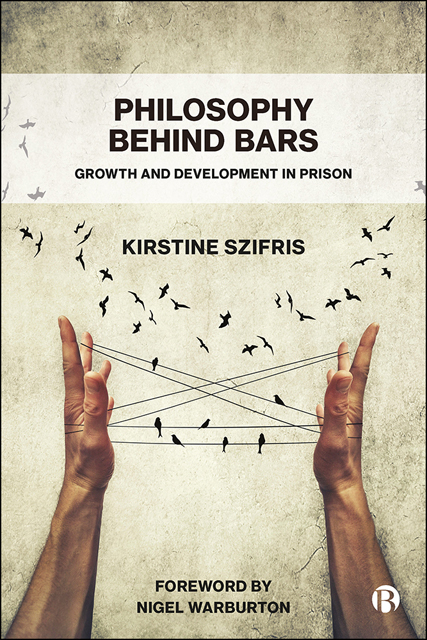Book contents
- Frontmatter
- Dedication
- Contents
- List of Boxes
- Acknowledgements
- Foreword
- 1 Philosophy, Identity and the ‘Ship of Theseus’
- 2 Towards Theory: People, Places and Voices
- 3 Survival, Plato and the Ideal Society
- 4 Kant, Bentham and the Question of Identity
- 5 ‘Why Do You Think That?’ Descartes, Hume and Knowledge>
- 6 Not Just an Offender, But a Person
- 7 Trying to Find a Community of Philosophical Inquiry
- 8 Finding Trust and Developing Relationships
- 9 Personal Self-Exploration
- 10 Towards a Framework for Understanding Philosophy in Prison
- 11 Final Reflections
- Appendix: Technical Methods
- Bibliography
- Index
7 - Trying to Find a Community of Philosophical Inquiry
Published online by Cambridge University Press: 15 April 2023
- Frontmatter
- Dedication
- Contents
- List of Boxes
- Acknowledgements
- Foreword
- 1 Philosophy, Identity and the ‘Ship of Theseus’
- 2 Towards Theory: People, Places and Voices
- 3 Survival, Plato and the Ideal Society
- 4 Kant, Bentham and the Question of Identity
- 5 ‘Why Do You Think That?’ Descartes, Hume and Knowledge>
- 6 Not Just an Offender, But a Person
- 7 Trying to Find a Community of Philosophical Inquiry
- 8 Finding Trust and Developing Relationships
- 9 Personal Self-Exploration
- 10 Towards a Framework for Understanding Philosophy in Prison
- 11 Final Reflections
- Appendix: Technical Methods
- Bibliography
- Index
Summary
My time in HMP Full Sutton provides a clear narrative of progress. The development of the dialogue, the changing attitudes towards philosophical content and the growing sense of community provides a means to understanding why philosophical dialogue might be relevant to the wider issues of a prisoner society. However, Full Sutton is, perhaps, best understood through the lens of community. Underpinning this, we begin to ‘set the scene’ for understanding the wider themes that emerged from this research – trust, relationships and wellbeing. Chapter 8 goes on to focus on trust and relationships, with Chapter 9 then articulating the relevance of wellbeing and selfexpression.
Full Sutton prison was divided in two – one half consisted of the ‘mainstream’ population ‘on normal location’. The other half, the vulnerable prisoners (VPs), were held in the vulnerable prisoner unit (VPU). The two populations rarely met and, in many ways, the prison operated, and felt like, two separate communities – co-existing, but never interacting, making use of the same physical environment, but occupying different wings, and attending the same workshops and education, but at different times.
The experience of teaching in Full Sutton was also a story of two halves. Each side of the prison had a different atmosphere, presented different challenges and involved very different types of philosophical conversation. However, despite the differences, the themes that emerged from the data cut both ways: trust, relationships, wellbeing and self-expression were relevant to all the participants, regardless of the population they resided in.
The journey here, so different from what happened in HMP Grendon, provides a means to understanding why philosophical dialogue might be relevant to the wider issues of a prisoner society. To understand the relevance of trust, relationships, wellbeing and selfexpression, we fi rst have to understand the prison. Fundamentally, in spite of the prevailing atmosphere in the prison (or perhaps because of it?), the philosophy classroom provided a rare space to develop a sense of community. As with the Grendon community of philosophical inquiry, philosophy and the use of dialogue provided the participants in Full Sutton with the same means to encourage them to listen to each other. Common ground was sought and found, understanding of each other grew, and relationships began to form.
- Type
- Chapter
- Information
- Philosophy behind BarsGrowth and Development in Prison, pp. 121 - 142Publisher: Bristol University PressPrint publication year: 2021

